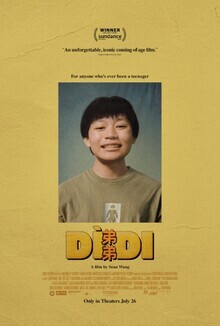Dìdi

It doesn’t happen often, but sometimes I return to a film to discover my initial gut reaction might have been a bit too harsh. When I first watched Sean Wang’s emotionally brutal coming of age film “Didi” at Sundance—where it won the festival’s audience award—I thought his follow-up to his Oscar-nominated documentary short (“Nǎi Nai & Wài Pó”) was, at best, a carbon copy of the kind of tropey, saccharine mining of memories that’s become Sundance’s forte. I could see passing references to “Eighth Grade,” “Skate Kitchen,” “Mid90s,” “Minari,” and “Minding the Gap”—better films that seemed to capture their intended spirit with greater urgency and originality. But upon a recent second watch, I have found that “Didi,” his feature directorial debut, is far stronger and far more affecting than I initially gave it credit for.
There are the universal qualities in Wang’s story that just so happens to occur in many of these films: Chris Wang (Isaac Wang)—affectionately called Didi by his mom, but derisively called Wang Wang by everyone else—is on the precipice of high school, soon to encounter all of the growing pains that happen when you pass from adolescence to teendom. He is an outcast in his mostly white Fremont, California enclave. It’s why, tellingly, he surrounds himself with other people of color like Farad (Raul Diad) and Jimmy/Soup (Aaron Chang). But even they’re assimilating into a kind of toxic, white broness that becomes common at that age. Their slow drift away from him, alienates Chris even further.
Chris can’t seem to find love or affection, anywhere, really. He has a crush on a girl named Madi (Mahaela Park), who he befriends at a party and talks with on AOL Instant Messenger. Despite his friends goading him to push his sexual boundaries, Chris, who is still very young, is far too nervous to make the leap. Even in the timid expressions of his inchoate feelings, much is revealed. “You’re pretty cute, for an Asian boy,” Madi, who might have issues with her own identity, backhandedly says. There are many racial slippages in “Didi,” such as Chris telling people he’s only half Asian, or him accusing his doting mom of being too Asian, or the way a group of boys add the word “Asian” to “Chris” when they chant his name. Chris wants to assume the role of boisterous hypermasculine cool kid, but it’s just not in him. And when he tries, he comes off as mean, vicious, and just plain hurt.
He blames many people for his perceived shortcomings: His older sister Vivian (Shirley Chen), who is an adversary until she realizes his deep loneliness; his clinging mother, Chungsing (Joan Chen), an aspiring artist who takes flak from her demanding mother-in-law and rebellious kids while her absent husband works in Taiwan; along with his classmates, who simply find him weird. Chris searches for acceptance from a group of older skaters and from his supposed friends at school, but each only reveal inadequacies he perceives in himself.




